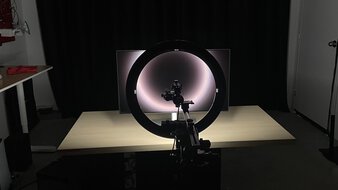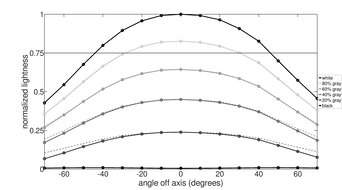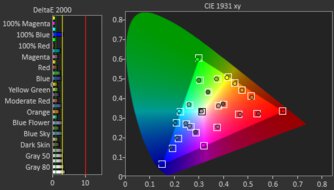Using a monitor in a vertical orientation can be helpful if you have a dual-monitor setup. For example, you can use one screen vertically next to your main display. Most monitors on the market aren't specifically designed for use only in a vertical orientation; instead, they have stands that allow the screen to rotate vertically. Although you can use most monitors in a vertical orientation with a proper mount, for this article, we only consider displays that can rotate vertically with the included stand, ensuring you don't have to worry about any extra expenses.
Besides the rotation, you have to consider other factors to ensure a monitor is good for what you need. Thinking about your budget is a good place to start. Having a high resolution for sharp text clarity is also important. While some programs don't render text as well in portrait mode as in a landscape orientation, the difference is hard to tell. Another thing to consider is the viewing angle to ensure that the image remains consistent when viewing from the side. You may also want to think about the monitor's size, which is ultimately a personal preference, but 24- and 27-inch monitors are generally the most popular to use vertically.
We've bought and tested more than 375 monitors, and below, you'll find our recommendations for the best vertical monitors. Also, see our recommendations for the best work monitors, the best monitors for dual setup, and the best portable monitors.
Quick Look


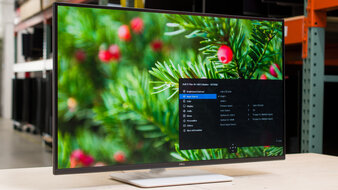


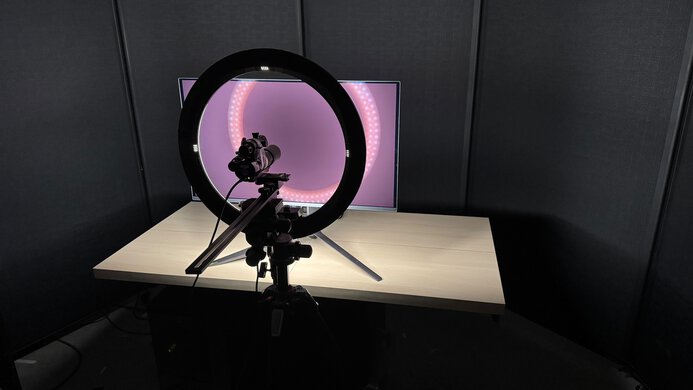
We buy and test more than 30 monitors each year, with units that we buy completely on our own, without any cherry-picked units or samples. We put a lot into each unbiased, straight-to-the-point review, and there's a whole process from purchasing to publishing, involving multiple teams and people. We do more than just use the monitor for a week; we use specialized and custom tools to measure various aspects with objective data-based results. We also consider multiple factors before making any recommendations, including the monitor's cost, its performance against the competition, and whether or not it's easy to find.
-
Best Vertical Monitor
 Office8.5Ergonomics9.7Rotate Portrait/LandscapeYes, Both WaysSDR Brightness8.3Viewing Angle8.4Editing7.9SDR Picture7.5HDR Picture6.2Color Accuracy8.1Size27"Panel TypeIPSMax Refresh Rate120 HzSee all our test resultsNative Resolution3840 x 2160
Office8.5Ergonomics9.7Rotate Portrait/LandscapeYes, Both WaysSDR Brightness8.3Viewing Angle8.4Editing7.9SDR Picture7.5HDR Picture6.2Color Accuracy8.1Size27"Panel TypeIPSMax Refresh Rate120 HzSee all our test resultsNative Resolution3840 x 2160The best vertical monitor that we've tested is the Dell U2725QE. It's a premium 4k, 27-inch display that you can easily rotate into portrait mode. It's a premium model with a bunch of features that can help if you have different monitors and computers in your setup. For starters, it has a ton of ports, including separate Thunderbolt and DisplayPort video outputs. These allow you to connect up to two extra monitors directly to this one, which helps if you want to place this monitor vertically alongside other monitors. It also delivers 140W of power over a USB-C port, and it has a KVM switch that makes it easy to change sources and use the same devices on both.
Besides that, the picture quality is good. Its wide viewing angle ensures that the image remains consistent no matter where you view it from, even in portrait mode. It also has a high 4k resolution for sharp text clarity, and it gets bright enough to fight some glare. You can also check out the similar Dell U3225QE if you want more screen space and don't mind spending more. However, you may find that a 32-inch screen is too big to use vertically.
-
Best Mid-Range Vertical Monitor
 Office8.5Ergonomics9.5Rotate Portrait/LandscapeYes, Both WaysSDR Brightness8.1Viewing Angle7.2Editing7.7SDR Picture6.9HDR Picture5.5Color Accuracy8.9Size27"Panel TypeIPSMax Refresh Rate60 HzSee all our test resultsNative Resolution3840 x 2160
Office8.5Ergonomics9.5Rotate Portrait/LandscapeYes, Both WaysSDR Brightness8.1Viewing Angle7.2Editing7.7SDR Picture6.9HDR Picture5.5Color Accuracy8.9Size27"Panel TypeIPSMax Refresh Rate60 HzSee all our test resultsNative Resolution3840 x 2160If you find that the Dell U2725QE is too expensive for something you'll use vertically, check out the cheaper 4k, 27-inch ASUS ProArt Display PA279CRV instead. It's lower-end than the Dell, with the main differences being the fact that it has fewer features. It has a smaller USB hub and doesn't have a KVM switch. Even though it provides less power delivery over USB-C, its 90W of power is still enough to charge your laptop while you're using it. Another difference is that instead of two video outputs like the Dell, it has one video output, so you can still connect one monitor to this one in a daisy chain or dual-monitor setup.
Despite the differences in features, it's similar in performance to the Dell. It comes with an extremely ergonomic stand, and you can rotate it into portrait mode in either direction. Plus, its wide viewing angle is helpful if you don't have the screen directly in front of you. It's also a good choice to use in a well-lit room as it gets bright, but reflections from sunny windows are distracting.
-
Best Lower Mid-Range Vertical Monitor
 Office8.4Ergonomics9.2Rotate Portrait/LandscapeYes, Both WaysSDR Brightness7.8Viewing Angle8.2Editing7.8SDR Picture7.5HDR Picture4.8Color Accuracy8.8Size27"Panel TypeIPSMax Refresh Rate120 HzSee all our test resultsNative Resolution3840 x 2160
Office8.4Ergonomics9.2Rotate Portrait/LandscapeYes, Both WaysSDR Brightness7.8Viewing Angle8.2Editing7.8SDR Picture7.5HDR Picture4.8Color Accuracy8.8Size27"Panel TypeIPSMax Refresh Rate120 HzSee all our test resultsNative Resolution3840 x 2160Should the ASUS ProArt Display PA279CRV still be too expensive for your needs, the Dell S2725QC is a great alternative that you can get for less. It's similar in picture quality to the ASUS, as it's another 4k, 27-inch display with sharp text clarity, wide viewing angle, and good brightness. That said, the main difference is that it has fewer features than the ASUS. It has a slightly smaller USB hub with one less USB-A port. Also, its USB-C port delivers less power, which is something to consider if you want to connect a power-hungry laptop. It doesn't have any video outputs either, so you have to make sure your laptop has enough ports for other monitors in your setup.
Regardless, it's a good monitor to use vertically thanks to its very ergonomic stand, so you can rotate it into portrait mode in either direction. It also has some advantages over the ASUS, as it has a higher 120Hz refresh rate that offers a smoother feel while scrolling through long webpages or documents.
-
Best Budget Vertical Monitor
 Office8.4Ergonomics9.2Rotate Portrait/LandscapeYes, Both WaysSDR Brightness8.0Viewing Angle8.3Editing7.9SDR Picture7.4HDR Picture4.9Color Accuracy8.9Size27"Panel TypeIPSMax Refresh Rate120 HzSee all our test resultsNative Resolution3840 x 2160
Office8.4Ergonomics9.2Rotate Portrait/LandscapeYes, Both WaysSDR Brightness8.0Viewing Angle8.3Editing7.9SDR Picture7.4HDR Picture4.9Color Accuracy8.9Size27"Panel TypeIPSMax Refresh Rate120 HzSee all our test resultsNative Resolution3840 x 2160If you're looking for the best vertical monitor in the budget category, check out the Dell S2725QS. It's a step-down option from the Dell S2725QC with fewer features, and you can often find it for less. It doesn't have any USB ports, so you can't connect your devices directly to the monitor, which is the trade-off for getting a cheaper option. Other than that, it's very similar to the higher-end S2725QC, as it comes with the same ergonomic stand. It's another 4k, 27-inch option, so text looks sharp. It even has the same 120Hz refresh rate, so scrolling through long documents feels smooth.
Despite having similar panels, the S2725QS actually has some advantages over the S2725QC. For example, it's brighter in SDR, and its coating does a better job at reducing glare, but reflections from very bright sources are still distracting. The S2725QS also displays a wider range of colors in HDR, but it has limited picture quality regardless, as blacks look gray and highlights don't pop.
-
Best Cheap Vertical Monitor
 Office7.1Ergonomics9.4Rotate Portrait/LandscapeYes, Both WaysSDR Brightness6.6Horizontal Viewing Angle8.3Editing6.3SDR Picture6.7HDR Picture2.5Color Accuracy7.8Size24"Pixel TypeIPSMax Refresh Rate100 HzSee all our test resultsNative Resolution1920 x 1080
Office7.1Ergonomics9.4Rotate Portrait/LandscapeYes, Both WaysSDR Brightness6.6Horizontal Viewing Angle8.3Editing6.3SDR Picture6.7HDR Picture2.5Color Accuracy7.8Size24"Pixel TypeIPSMax Refresh Rate100 HzSee all our test resultsNative Resolution1920 x 1080If you want something simple and cheap, look into the Dell P2425H. It has a lower resolution and a smaller screen than the Dell S2725QS, so images are less detailed, but the text clarity is still decent. It doesn't get as bright as the S2725QS either, so you need to use it in a dim or dark room to avoid any visibility issues.
That said, it has features most entry-level monitors don't have, like the extremely ergonomic stand that you can easily rotate into portrait mode. It even has a USB hub that includes three USB-A ports and a USB-C port, making it easy to connect your devices, like a mouse and keyboard, directly to the monitor. However, the USB-C port doesn't support DisplayPort Alt Mode like on higher-end monitors. This means you can't display video signals from it, and it's meant for data transfer or charging small devices.
Notable Mentions
-
ASUS ProArt Display PA27JCV:
The ASUS ProArt Display PA27JCV is a 5k, 27-inch monitor with a higher resolution than the Dell U2725QE. It's something to consider if you want the higher pixel density, but it costs more and has fewer features.
See our review -
Acer Nitro XV275K P5biipruzx:
The Acer Nitro XV275K P5biipruzx is a mid-range 4k monitor that has better HDR picture quality than the ASUS ProArt Display PA279CRV. The Acer is something to consider if you view or edit HDR content. However, it has a smaller USB hub than the ASUS.
See our review -
ASUS ProArt Display PA278CV:
The ASUS ProArt Display PA278CV is a 1440p budget-friendly monitor with a few extra features compared to the Dell S2725QS. For example, it has a DisplayPort output for daisy chaining. However, it's also harder to find at times than the Dell and has a lower resolution.
See our review -
MSI G274QPF-QD:
The MSI MPG G274QPF-QD is a cheap monitor with a bigger screen and higher resolution than the Dell P2425H. It also has some productivity features, like a USB-C port with DisplayPort Alt Mode. However, it usually costs a bit more than the Dell.
See our review
Recent Updates
Jan 28, 2026:
We verified that all the recommended monitors are available to purchase. We also added the Acer Nitro XV275K P5biipruzx to the Notable Mentions.
Oct 08, 2025:
We added the Dell S2725QC as the 'Best Lower Mid-Range Vertical Monitor' to give another option, and we replaced the Dell P2423D with the Dell S2725QS, which is easier to find. In the Notable Mentions, we replaced the Dell S2722QC and the Dell U2723QE with the ASUS ProArt Display PA27JCV and the MSI G274QPF-QD.
May 30, 2025:
We replaced the Dell S2722QC with the Dell U2725QE because it has extra features. We also added the ASUS ProArt Display PA279CRV as the 'Best Mid-Range Monitor.' Lastly, we removed the ASUS ROG Strix XG27ACS and renamed the Dell P2423D to the 'Best Budget Monitor' for consistency with other recommendations. In the Notable Mentions, we replaced the Dell S2721QS with the S2722QC and the ASUS VG246H with the Dell U2723QE.
Feb 19, 2025:
We replaced the ASUS ProArt Display PA278QV with the ASUS ROG Strix XG27ACS because it has more features. We also replaced the Dell G2724D with the ASUS ProArt Display PA278CV in the Notable Mentions, as the Dell is hard to find. Lastly, we introduced a new format to the article and updated the text to reflect these changes.
Nov 25, 2024:
We added the Dell G2724D to the Notable Mentions.
All Reviews
Our recommendations are based on what we think are the best vertical monitors that are currently available. They're adapted to be valid for most people in each price range. The rating is based on our review, factoring in price and feedback from our visitors.
If you'd prefer to make your own decision, here's the list of all our reviews of monitors that can rotate vertically. Be careful not to get too caught up in the details. Most monitors are good enough to please most people, and the things we fault monitors on are often not noticeable unless you really look for them.

